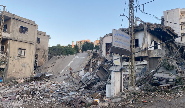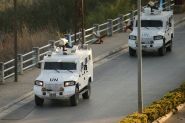- Home
- War in the Middle East
- Schenker: A Bad Ceasefire Will Defer the Next Round of Bloodletting

Former Assistant Secretary of State for Near Eastern Affairs David Schenker wrote an article in the National Interest on December 9 comparing the July 2006 war in Lebanon to that in Gaza today.
Former US Assistant Secretary of State for Near Eastern Affairs David Schenker drew a comparison between Israel’s ongoing war against Hamas and the one it waged against Hezbollah in 2006, noting that Washington has to deal with similar diplomatic challenges that existed then.
In an article he wrote to the National Interest on December 9, Schenker said that the ceasefire in 2006 was inconclusive in the sense that it did not eliminate Hezbollah’s threat on Israel, a matter that the US will try to avoid with Hamas now, though it is running out of time.
Schenker warns against a "bad" ceasefire, "which does not resolve the issue of Hamas' violence," believing that such a solution "will merely defer the next round of bloodletting," as it would leave Hamas in place to regroup.
In his view, the circumstances in 2006 with Hezbollah and with Hamas today are similar: the United States initially opposed the ceasefire proposal adopted by the international community in 2006. Schenker cites then Secretary of State Condoleeza Rice, who declared that "a ceasefire would be a false promise if it simply returns us to the status quo."
But as the war progressed and casualties in Lebanon mounted, diplomatic pressure reached a fever pitch. The conditions set by the Bush administration for the ceasefire were included in UN Security Council Resolution 1701. In accordance with this resolution, the United Nations Interim Force in Lebanon (UNIFIL) was reinforced. It was also tasked with "ensuring that Hezbollah cannot rearm." It was, according to Rice, an "imperfect solution," but an "arrangement that would stabilize the border."
According to Schenker, Resolution 1701 put an end to the 2006 war, but consecrated "a divine victory" for Hezbollah, which "in five years has strengthened and considerably modernized its arsenal," so that "the threat on Israel's northern border is worse" now than in 2006.
In view of the continuing clashes in Gaza, the high number of civilian casualties, and the fear of a possible spread of the conflict, the Biden administration will have to yield to pressure, as did the Bush administration in 2006, and work for an end to the armed conflict, said Schenker. In this respect, he stressed that "American support for (Israel's) campaign will not last indefinitely." "The administration's patience will probably be measured in weeks rather than months," he added.
On Friday, the United States vetoed a UN Security Council resolution calling for a ceasefire in Gaza.
In the current context, Schenker calls for lessons to be learned from the past. In the absence of a decisive setback for Hamas in this war, the movement will re-emerge and Gaza will return to the situation prior to October 7, he concluded.
Former US Assistant Secretary of State for Near Eastern Affairs David Schenker drew a comparison between Israel’s ongoing war against Hamas and the one it waged against Hezbollah in 2006, noting that Washington has to deal with similar diplomatic challenges that existed then.
In an article he wrote to the National Interest on December 9, Schenker said that the ceasefire in 2006 was inconclusive in the sense that it did not eliminate Hezbollah’s threat on Israel, a matter that the US will try to avoid with Hamas now, though it is running out of time.
Schenker warns against a "bad" ceasefire, "which does not resolve the issue of Hamas' violence," believing that such a solution "will merely defer the next round of bloodletting," as it would leave Hamas in place to regroup.
In his view, the circumstances in 2006 with Hezbollah and with Hamas today are similar: the United States initially opposed the ceasefire proposal adopted by the international community in 2006. Schenker cites then Secretary of State Condoleeza Rice, who declared that "a ceasefire would be a false promise if it simply returns us to the status quo."
But as the war progressed and casualties in Lebanon mounted, diplomatic pressure reached a fever pitch. The conditions set by the Bush administration for the ceasefire were included in UN Security Council Resolution 1701. In accordance with this resolution, the United Nations Interim Force in Lebanon (UNIFIL) was reinforced. It was also tasked with "ensuring that Hezbollah cannot rearm." It was, according to Rice, an "imperfect solution," but an "arrangement that would stabilize the border."
According to Schenker, Resolution 1701 put an end to the 2006 war, but consecrated "a divine victory" for Hezbollah, which "in five years has strengthened and considerably modernized its arsenal," so that "the threat on Israel's northern border is worse" now than in 2006.
In view of the continuing clashes in Gaza, the high number of civilian casualties, and the fear of a possible spread of the conflict, the Biden administration will have to yield to pressure, as did the Bush administration in 2006, and work for an end to the armed conflict, said Schenker. In this respect, he stressed that "American support for (Israel's) campaign will not last indefinitely." "The administration's patience will probably be measured in weeks rather than months," he added.
On Friday, the United States vetoed a UN Security Council resolution calling for a ceasefire in Gaza.
In the current context, Schenker calls for lessons to be learned from the past. In the absence of a decisive setback for Hamas in this war, the movement will re-emerge and Gaza will return to the situation prior to October 7, he concluded.
Read more



Comments